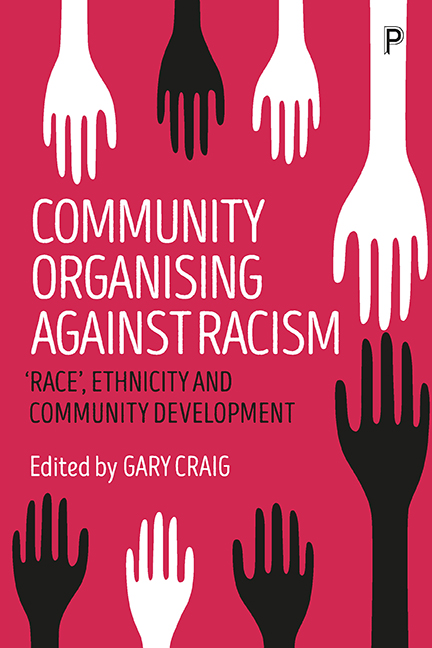Book contents
- Frontmatter
- Dedication
- Contents
- List of figures
- Author biographies
- List of abbreviations
- Introduction
- Section One Community development with ethnic minorities: history, theory, policy
- Section Two Building capacity with BME groups
- Section Three Working with Roma communities
- Section Four Global experience
- Section Five Working across cultural boundaries: ideological and personal reflections
- Afterword: Messages for community development in working with minority groups
- Index
Five - sampad: working with arts and culture
Published online by Cambridge University Press: 12 April 2022
- Frontmatter
- Dedication
- Contents
- List of figures
- Author biographies
- List of abbreviations
- Introduction
- Section One Community development with ethnic minorities: history, theory, policy
- Section Two Building capacity with BME groups
- Section Three Working with Roma communities
- Section Four Global experience
- Section Five Working across cultural boundaries: ideological and personal reflections
- Afterword: Messages for community development in working with minority groups
- Index
Summary
Introduction
sampad is a South Asian arts and heritage organisation based at the Midlands Arts Centre (mac) in Birmingham, UK that develops highquality dance, music, drama, literature, poetry, crafts performances and events based on traditions drawn from the countries of the Indian subcontinent to engage in a creative intercultural dialogue with all sections of Britain's increasingly diverse society. It deploys skills in community education and community development to reach a great variety of audiences. Through the language of art, it explores the relationship between traditional and emerging identities, between established and popular art forms, within and between different religious, cultural and social groupings and between settled communities and new migrants to create the basis for a wider and more informed debate in wider civil society about the construction of community and identity in the modern era. This chapter explores the extent to which sampad has met its aims and objectives. sampad 's formal mission statement now is to connect people and communities with British Asian arts and heritage and to play a pro-active role in the creative economy.
The thinking
Twenty-first-century identities are fluid and dynamic. Any attempt to fix them in time and space by using anthropology, geography, mythology or religion freezes identity and turns it into a caricature of itself. However, the paradox is that without reference to these markers, discourse about ‘identity’ and ‘community’ cannot begin. There has to be a full stop at the end of a sentence for it to mean something.
We need boundaries across which we can create a dialogue. These boundaries are real and palpable. But they are also fictional and not there forever; there is nothing absolute about them. They are artefacts, not nature-facts. In essence, they are primarily constructions of the mind and can therefore be deconstructed. This applies particularly in relation to cultural boundaries. There is a saying in India, ‘culture does not make people, people make culture’. And what is made can be unmade.
- Type
- Chapter
- Information
- Community Organising against Racism'Race', Ethnicity and Community Development, pp. 97 - 108Publisher: Bristol University PressPrint publication year: 2017

